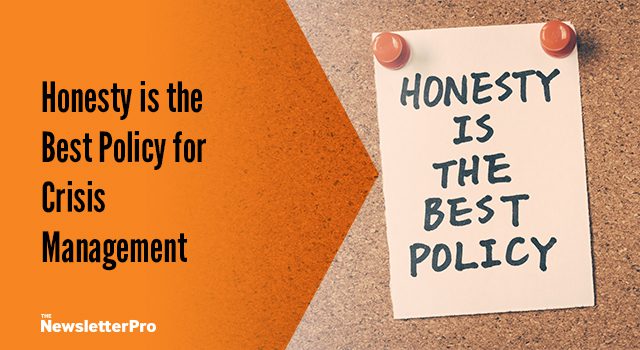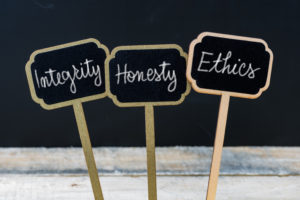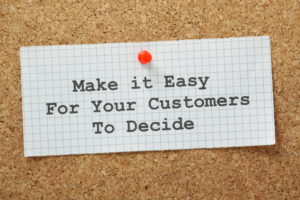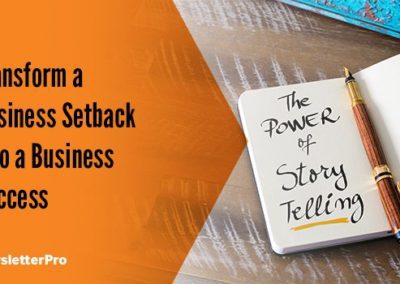All companies screw up from time to time. What makes crisis management worse is when they aren’t honest after a mistake.

Not only is it unethical to cover up an error, but it’s often the kiss of death for customers. People can excuse an error. What they can’t excuse is lying. How you manage a crisis matters just as much, if not more, than the crisis itself.
The recent Equifax scandal is a perfect example of how dishonesty in crisis management breeds anger. Now, people would’ve have been mad no matter what Equifax had done in the wake of losing the personal data of more than 100 million Americans. More infuriating is that the company’s leadership knew what happened long before they disclosed it publicly. They even went so far as to sell some of their stock. How long do you think it will be before customers trust them again?
How To Handle It Correctly
 But for every instance of a company poorly handling fallout, there’s a counterexample where another does the right thing. In January of 2017, The Honest Company’s organic baby powder was recalled due to a possible contamination, putting their name and brand promise to the test. The company worried that its containers of baby powder might have been contaminated with microorganisms that cause skin and eye infections.
But for every instance of a company poorly handling fallout, there’s a counterexample where another does the right thing. In January of 2017, The Honest Company’s organic baby powder was recalled due to a possible contamination, putting their name and brand promise to the test. The company worried that its containers of baby powder might have been contaminated with microorganisms that cause skin and eye infections.
So what is it about The Honest Company that enabled it to weather a storm like this, while a similar problem so negatively impacted Chipotle? Ultimately, it’s about the consumers’ perception of the problem, the issue’s relation to the brand identity, and the company’s crisis management.
Before we delve into how The Honest Company handled their particular crisis, take a look at 9 famous examples from the past.
Share Your Values With Customers
 Jessica Alba founded The Honest Company, and aside from the financial incentive, Alba had a compelling reason to launch this brand. She was a new mother who wanted to make sure her baby was safe.
Jessica Alba founded The Honest Company, and aside from the financial incentive, Alba had a compelling reason to launch this brand. She was a new mother who wanted to make sure her baby was safe.
Alba suffered a series of illnesses growing up, likely due to questionable body products. This spurred her to create a company that would provide cleaner and safer items than those currently on the market. She aimed to create a company that was 100 percent transparent about the ingredients it used.
Alba knew that other companies frequently hid toxic ingredients behind the ambiguous label of “fragrances” in their baby products. She was determined to avoid harming her own children while taking care of their daily needs. But she had a difficult time finding products she could feel good about. So, she created The Honest Company to make nontoxic, all-natural household items she and her customers could trust.
The Honest Company found a way to differentiate itself by operating under a unique set of principles. Its “honestly FREE guarantee” states, “You can rest easy knowing The Honest Company’s products are made without potentially health-compromising chemicals or compounds.” The Honest Company even has a detailed page on their website explaining their principles.
Stay True During Crisis Management

So, what happens when a company promising that its products are safe ends up shipping baby powder with infection-causing microorganisms? It’s a pretty clear contradiction of their guarantee. But that’s what makes their response so meaningful.
A very public recall — wherein the company gets in front of the problem, rather than waiting to see if anyone becomes ill — actually reaffirms its commitment to only selling healthy products.
Now, does that mean every customer is going to shrug it off? Of course not! Anytime a brand issues a recall, some consumers are going to bear a permanent grudge. I know someone who never went back to Jack-in-the-Box after it suffered a 1993 E. coli outbreak that infected 732 people!
But brand loyalty and crisis management counts for a lot. When a brand like The Honest Company calls itself honest and then actually behaves honestly and transparently during tough times, it reminds customers that they’ve made the right choice. Have you asked yourself recently if your business has stayed true to its values? This article from Inc. will give you tips on how to tell.
Brand Identity + Honesty = Customer Loyalty
 The Honest Company sets itself apart from competing brands because of two things:
The Honest Company sets itself apart from competing brands because of two things:
- Its commitment to totally safe products
- Its commitment to total honesty and transparency
What’s the compelling alternative to customers who are interested in buying non-toxic household products they can trust? That’s a big part of why The Honest Company’s crisis management is so good and their customer retention is so high.
So, what lessons can we take away from The Honest Company? A few jump out. First, have a guarantee, promise, or unique sales proposition that resonates with your audience. Second, and most importantly, do everything you can to stay true to your company’s brand identity. For example, it does you no good to say you’re the best at communication if you have no systems to ensure good communication.
All of us can learn from how The Honest Company dealt with crisis management. Here are some tips to help with your next brand crisis management. You don’t need a disaster, though, to take stock of your brand identity. What are your company’s values? And do you live them even when times are tough?





